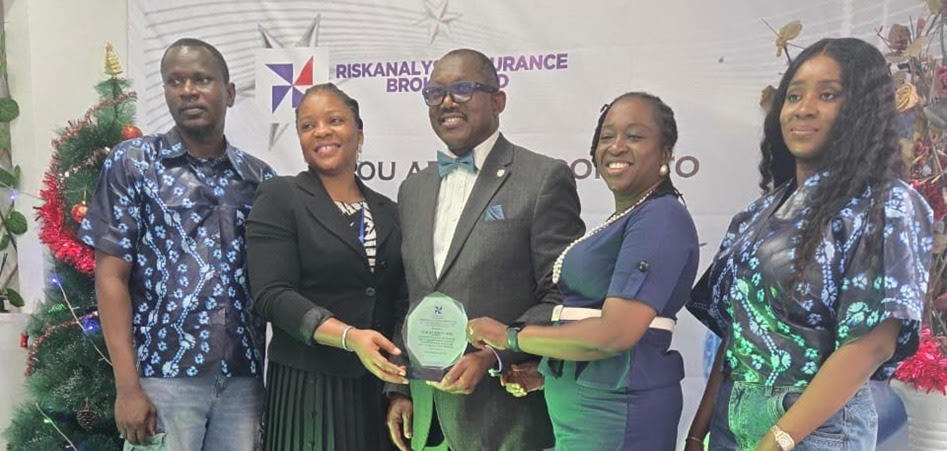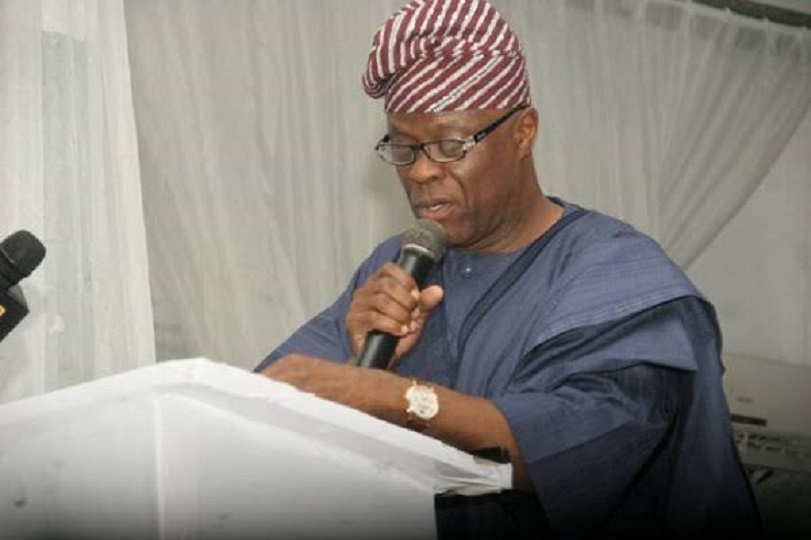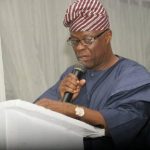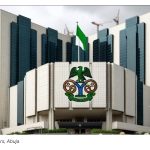Economy
Female Participation in Entrepreneurship in Nigeria at 58%—Adeeko

By Tenebe Anthonia
The Divisional Head of Shared Services at the Nigerian Stock Exchange (NSE), Mr Bola Adeeko, has canvassed for more support for female entrepreneurs in the country, saying that the present COVID-19 pandemic could badly affect the progress of their businesses.
Mr Adeeko, speaking at a webinar themed Supporting SMEs and Women-Owned Businesses in Corporate Value Chains, argued that the global health crisis could hinder the progress made in advancing women’s entrepreneurship in Nigeria.
He admitted that both male and female business owners in the country face significant issues, especially in “accessing finance to sustain or expand their businesses,” but the progress made in female participation in entrepreneurship should not be jeopardised.
“With the high level of female participation in entrepreneurship (OECD in 2019 puts female participation at 58 per cent compared to male’s 45 per cent male), experts anticipate that the COVID-19 crisis will hinder the progress made in advancing women’s entrepreneurship in Nigeria.
“To this end, we are pleased to have brought together an expert panel of discussants who have made an indisputable business case for gender-inclusive practices in corporate value chains and highlighted strategies for improving the participation of women-owned and run SMEs,” he said.
The coronavirus pandemic has continued to disrupt economic activities all over the world, and the informal sector and small and medium enterprises (SMEs) are at the centre of the crises.
In light of the strong representation of female entrepreneurs within the SMEs space, the NSE hosted a webinar in collaboration with the International Finance Corporation to address the various issues in the sector.
Looking at the current SMEs landscape, the Executive Director, Fate Foundation, Ms Adenike Adeyemi, indicated that, “When we look at the micro-segment, we see that the number of women-owned businesses is equal to men-owned businesses.
“However, as we move on to the SMEs segment, we see a drop in female participation to less than 25 per cent which suggests that women are either dropping off or not growing as quickly as their male counterparts.”
In identifying some of the constraints female entrepreneurs face, Nigeria Country Director, WeConnect International, Yeshua Russel highlighted, “While it is imperative that concerted efforts are made to link women to the value chains of large corporations in order to empower them, there are barriers that must be addressed which include inadequate technical capacity; low level of collaboration among women-owned businesses; and lack of access to finance. Consequently, we need to create more structures and systems that can educate and incorporate women to raise their level and quality of participation.”
The Director, Corporate Affairs and Sustainable Business, Ghana and Nigeria, Unilever, Soromidayo George, further expounded on this saying, “From our experience with Ebola and other epidemics, the economic impacts of a health crisis will have a disproportionate impact on women which will widen the gender inequality gap.
“This is particularly attributable to the harmful social norms that limit the expectations of what women can and should do especially along familial and business spectrums. We must, therefore, articulate organised ways to tackle these expectations and lay the right building blocks to achieve gender equality.”
All the panellists during the session agreed on the fundamental needs of a business, particularly women-owned business as articulated by Executive Director, Business Banking, Access Bank, Ms Ayodele Olojede.
She noted that, “In building and nurturing women-owned businesses, it is important to adopt a holistic approach that focuses on the four fundamentals of finance, information, market and technology.”
Taking this a step further, the Director, Enterprise Development Centre, Lagos Business School. Mr Peter Bamkole emphasised that the, “Capacity building must go beyond training in the development of women-owned businesses. Women are fast and adaptive learners but must also be given the support of mentoring and hand-holding to reach their highest potential.”
In closing out the event, the Head of Corporate Communications at the NSE, Mr Olumide Orojimi, emphasised the need to continue the conversation beyond the webinar stating, “Bridging the gender inequality gap is a journey and it is one we must all contribute to actively. We at the NSE are proud of our efforts at advancing female participation within our operations and our ecosystem and our collaboration with IFC is one of the efforts we are truly proud of.”
It would be recalled that The Nigeria2Equal initiative was kicked-off in May with a webinar that explored the gender implications of COVID-19 for women as employees. The conversations that ensued during that webinar highlighted the differential socioeconomic impacts of the COVID-19 pandemic on men and women, with women predicted to face more negative impacts.
Economy
Stanbic IBTC Insurance Triumphs at 2025 Risk Analyst Awards

By Modupe Gbadeyanka
A subsidiary of Stanbic IBTC Holdings Plc, Stanbic IBTC Insurance, has continued to showcase institutional excellence, becoming one of Nigeria’s top-performing insurers.
At the 2025 Risk Analyst Insurance Brokers Performance Review Awards, the underwriting firm won the Life Insurance category for its operational discipline, prompt claims settlement, and partnership-driven approach that fosters long-term confidence with clients and brokers.
The organisers were impressed with the company’s performance in life insurance, which reflects the broader institutional direction of Stanbic IBTC Holdings, which is building resilient, trusted, and high-performing financial institutions that contribute to Nigeria’s economic growth and the development of the insurance sector.
“At Stanbic IBTC Insurance, trust is built through reliable performance, timely claims settlement, and service that supports customers when it matters most. This recognition reflects the quality of service we provide for our clients and partners.
“We are honoured to receive this accolade and will continue to raise standards across the industry,” the chief executive of Stanbic IBTC Insurance, Akinjide Orimolade, stated.
Also commenting, the chief executive of Stanbic IBTC Holdings, Mr Chuma Nwokocha, said, “We are proud of this achievement, which highlights the strength of our insurance business and the broader Stanbic IBTC Group’s focus on building strong, enduring institutions.
“Stanbic IBTC Insurance continues to set benchmarks in professionalism, client service, and operational excellence; reinforcing our role as a trusted partner to individuals and businesses across Nigeria.”
Every year, Risk Analyst Insurance Brokers Limited, which organises the event, carries out an annual assessment of insurance underwriters by evaluating partners based on key criteria, including claims settlement efficiency, service delivery, responsiveness, and broker–underwriter collaboration.
The initiative aims to promote accountability, raise service standards, and strengthen trust across Nigeria’s insurance ecosystem.
The 2025 performance of Stanbic IBTC Insurance highlights its role as a dependable and credible underwriting partner in the market.
Economy
Lagos Unveils Roadmap to Establish West Africa’s International Financial Hub

By Adedapo Adesanya
Nigeria’s commercial nerve centre, Lagos State, has announced plans to establish West Africa’s premier International Financial Centre to unlock international investment, innovation, and sustainable growth.
TheCityUK, in partnership with the UK Government, Lagos State Government, Lagos International Financial Centre Council (LIFCC), and EnterpriseNGR, on Monday unveiled a landmark report, Establishing an International Financial Centre in Lagos (LIFC), Nigeria, outlining a strategic roadmap to achieve the goal.
The establishment of a Lagos International Financial Centre aligns with Nigeria’s Agenda 2050 and the Lagos State Development Plan 2052 to deliver long-term economic prosperity, deepen financial markets, and attract productive global investment.
According to a statement, the project is hinged on a public-private partnership bringing visionary leadership from the government together with private sector companies seeking to tap into Nigeria’s young, dynamic market to deliver economic growth.
The unveiling was done at the State House Marina with guests including Lagos State Governor, Mr Babajide Sanwo-Olu, British Deputy High Commissioner Mr Jonny Baxter, and EnterpriseNGR Board Chairman and CEO, Mr Aigboje Aig-Imoukhuede and Mr Obi Ibekwe.
Lagos International Financial Centre Council will support Nigeria’s ambition to become an upper-middle-income country by 2050, driving inclusive growth, reducing poverty, and creating high-value jobs, especially for Nigeria’s talented youth, as per the report, adding that it will benefit from the strong UK-Nigerian co-operation, building on best practices and global benchmarks to align the LIFC with international standards.
The report proposes creating an independent International Financial Centre in Lagos to enhance regulatory clarity, simplify tax and policy frameworks, and boost investor confidence. It recommends an initial focus on Green and Sustainable Finance, FinTech and Innovation, and Commodities and Capital Markets, supported by strong governance, legal reforms, stakeholder collaboration, and targeted talent development.
Speaking on this, Governor Sanwo-Olu said, “Lagos is fully committed to the birth of the International Financial Centre. We know that it is a veritable means of supporting seamless trading and to enhance competitiveness of financial markets.
“As Nigeria’s largest economic and financial centre, Lagos plays a critical role in driving the nation’s capital markets. We need to create an ecosystem that will help to facilitate investment flows, enhance market liquidity, and promote financial literacy.
“The LIFC initiative will not only strengthen our market infrastructure but also unlock new opportunities for public-private partnerships in technology and capital market development. It will support seamless trading, attract foreign investment and enhance the competitiveness of financial markets.”
On his part, Mr Jonny Baxter, British Deputy High Commissioner, commented, “The launch of the Lagos International Financial Centre report reflects the deepening of the UK-Nigeria partnership, combining Lagos’s comparative strengths with UK expertise. Anchored in clear, evidence‑based analysis and launched at a pivotal moment in Nigeria’s reform journey, the LIFC has the potential to unlock major domestic and international investment, deepen capital markets, create jobs, and drive sustainable economic growth across the country, not just in Lagos State.”
Mrs Nicola Watkinson, Managing Director, International, TheCityUK, said, “Nigeria is a high-growth, dynamic and large market and the Lagos International Financial Centre could be vital to its future. By building a modern, integrated business and regulatory environment and financial ecosystem, the LIFC will support the attraction of global and domestic capital, deepen domestic markets, facilitate innovation in FinTech and green finance, and create high‑value jobs for Nigeria’s youth.
“Supporting the development of Lagos as an international financial centre is a clear example of how the UK and Nigeria are deepening their strategic partnership.”
Economy
Nigeria Now Consolidating Reforms for Economic Stability—Edun

By Adedapo Adesanya
The Minister of Finance and Coordinating Minister of the Economy, Mr Wale Edun, has stressed that Nigeria was now consolidating its macroeconomic reforms to sustain economic stability in an increasingly volatile global environment.
The Minister spoke at a high-level panel on Fiscal Policy in a Shock – Prone World at the ongoing Al Ula conference for Emerging Market Economies in Riyadh, Saudi Arabia.
“Nigeria’s macroeconomic and fiscal reforms are working. Momentum must be maintained, and the benefits channelled towards long-term growth and resilience,” he stated.
He said the government is also leveraging digital tools to improve revenue assurance, while deepening fiscal and monetary coordination and promoting realistic budgeting practices to ensure durable fiscal discipline.
He noted that despite accounting for a significant share of global growth, population and natural resources, emerging economies remain under-represented in global financial decision-making.
Mr Edun also highlighted the growing strategic importance of Gulf nations in the evolving global economic landscape.
He said countries in the Gulf are increasingly shaping global trade routes, investment flows and sources of capital, making them critical partners for emerging economies such as Nigeria.
The finance minister stressed Nigeria’s commitment to building stronger partnerships that promote a more inclusive and equitable global financial system.
He said Nigeria was positioning itself to engage constructively with global partners to support reforms that unlock growth, stability and shared prosperity.
Mr Edun’s call comes amid mounting global economic pressures. Many emerging economies are grappling with high debt levels, elevated inflation, volatile capital flows and tightening global financial conditions.
Rising interest rates in advanced economies have increased debt-servicing costs, while currency volatility has strained fiscal and external balances across Africa and other developing regions.
Global trade is also facing increased fragmentation due to geopolitical tensions, supply chain disruptions and protectionist tendencies.
These trends have disproportionately affected emerging markets that depend heavily on trade, foreign investment and access to international finance.
For Nigeria, the push for a global economic reset aligns with ongoing domestic reforms aimed at stabilising the macroeconomic environment.
The country has embarked on exchange rate reforms, fiscal consolidation and efforts to attract long-term investment to support growth and job creation.
Mr Edun has repeatedly argued that without reforms to the global financial system, domestic policy efforts in emerging economies risk being undermined by external shocks.
At the Al Ula conference, he reiterated that a more balanced global system would enhance resilience, improve access to finance and support sustainable development.
He said Nigeria would continue to engage in global policy conversations to ensure that emerging economies are not only rule-takers but active shapers of the new global economic order.
-

 Feature/OPED6 years ago
Feature/OPED6 years agoDavos was Different this year
-
Travel/Tourism9 years ago
Lagos Seals Western Lodge Hotel In Ikorodu
-

 Showbiz3 years ago
Showbiz3 years agoEstranged Lover Releases Videos of Empress Njamah Bathing
-

 Banking8 years ago
Banking8 years agoSort Codes of GTBank Branches in Nigeria
-

 Economy3 years ago
Economy3 years agoSubsidy Removal: CNG at N130 Per Litre Cheaper Than Petrol—IPMAN
-

 Banking3 years ago
Banking3 years agoSort Codes of UBA Branches in Nigeria
-

 Banking3 years ago
Banking3 years agoFirst Bank Announces Planned Downtime
-

 Sports3 years ago
Sports3 years agoHighest Paid Nigerian Footballer – How Much Do Nigerian Footballers Earn












